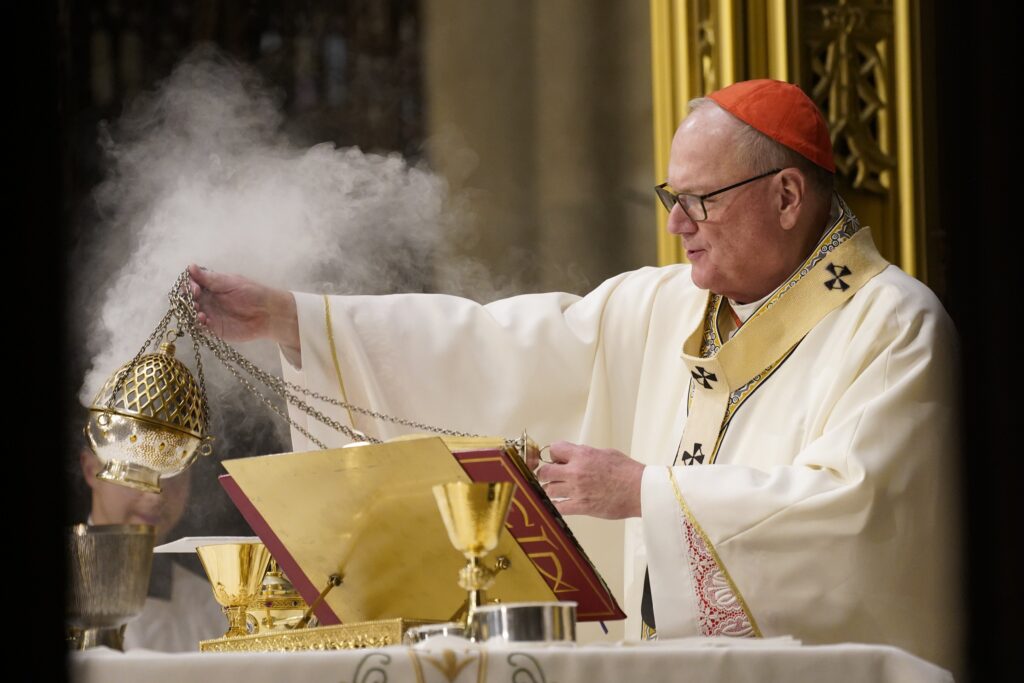
Cardinal Dolan: Are Sunday Masses Just Too Long?
By: Cardinal Timothy M. Dolan
“One question I always posed was, ‘How can we get people back to Sunday Mass? Why have so many of our folks stopped coming?'”

In our preparation for the Synod, here in the Archdiocese of New York, close to 7,000 people accepted our invitation to attend listening sessions or respond online to issues of concern in the life of the church today. One question I always posed was, “How can we get people back to Sunday Mass? Why have so many of our folks stopped coming?”
I was amazed at the high interest this generated. Apart from the predictable carping from both fringes — the far left claiming that the only way to increase Mass attendance was to drop all liturgical guidelines and go back to the “do-your-own-thing” hootenannies of the ’70’s, or the alt-right urging turning the altar around and getting the fiddlebacks out of mothballs — the largest majority replied that the top reasons people were no longer coming to Sunday Mass were — are you ready for this? — one, because they couldn’t understand the priest; two, their parish had been closed; and, three, Mass was too long!
Let’s concentrate on the third reason. At first, I was prone to dismiss this. But, after re-considering the dozens and dozens of such replies — admittedly far from a scientific survey — I concluded that maybe these folks were on to something. It was very clear from the tenor of their responses that these were women and men who loved the Eucharist, who would rarely themselves miss Sunday Mass and were the first ones back after the pandemic restrictions were mercifully lifted; who gladly welcomed the genuine liturgical renewal of the council, who were not asking for a “quickie” Sunday Mass, who knew that a reverent, participative, joyful celebration of the Sunday Eucharist demands a chunk of quality time, but who were still exhausted from “marathon Masses” which they contend are driving the folks away.
Could they be on to something? A liturgical scholar observed to me recently, “The greatest advance of liturgical renewal after the council was the restoration of the prominence and solemnity of the Easter Vigil. But the greatest negative of these last decades has been that every Sunday Mass is now as long as Holy Saturday!”
The dismal stories the people shared with me reached litany length. Now, they tell me, Mass starts with music rehearsal, then an obligatory “greeting” to those around you. By then, we’re five minutes past when Mass was supposed to start. The celebrant will usually give a lengthy introduction; the “Gloria” can exhaust the angelic choir, to say nothing of an unending sung responsorial psalm. The prayers of the faithful can go on forever, with the final petition — for the deceased — added to on the spot as some are dropping dead in front of us. Then we sit and wait awhile for the collection and offertory procession. The “Lamb of God” can reach the length of a baseball game. Often, we add a “reflection” after communion, with subsequent announcements. Don’t forget the long list of “thank you’s” for all those who had a part in Mass. God forbid we would leave before all five verses of the closing hymn are sung . . . and I have not even mentioned the biggest culprit of all — the mammoth homily from priests and deacons who ignore Pope Francis’ admonition to keep homilies at 8-10 minutes!
Now, although clearly exaggerating for effect, I’m not making this up. All of the above were comments I received. As a celebrant, I was somewhat stung, but forced to wonder if these good people — who, I remind you again, realize that a well-done liturgy takes time — might indeed have a point.
And, as one priest wrote, the Eucharistic prayer is now an afterthought. “It used to be,” he commented, “that many wrongly acted as if everything prior to the offertory was unimportant; now, it seems that everything after the Liturgy of the Word is second class. Time it,” he dared me. “A sung ‘Gloria’ or a sung responsorial psalm, or the ‘Lamb of God’ can be longer than the Eucharistic prayer.”
So (my correspondents weighed in), an hour-and-a-half Mass — not just on solemnities, but every Sunday — has become normal, and they candidly propose that this is one of the factors driving people away.
I don’t know what to think. Somewhere in between the racing 28-minute Sunday Masses of the past and the 90-minute marathon Masses of today would seem to be the dream.
I do know that the late, great Pope Saint John Paul II had a point: silence must be part of the Eucharist. The verbosity at Mass, our compulsion as celebrants to comment constantly and explain everything at every Mass, and the tendency of choirs, who do great jobs, to fill every free moment with another verse, is grating on the people.
Pretty soon, Mass will be very short, because we priests may be the only ones there!
– – –
Cardinal Timothy M. Dolan serves as Archbishop of the Archdiocese of New York.

